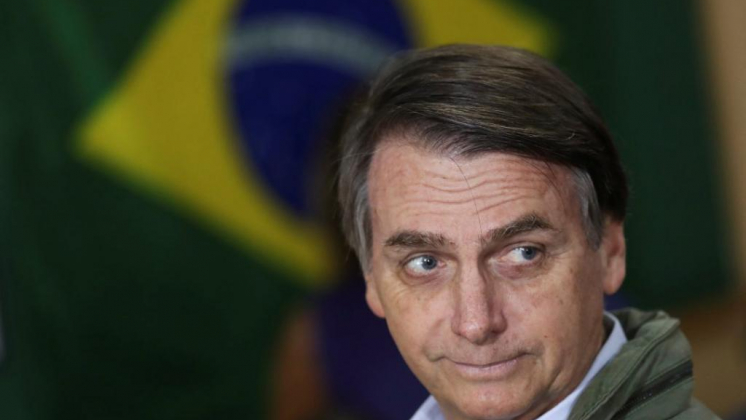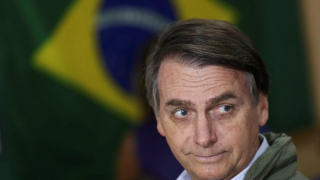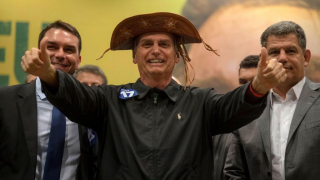Alain de Benoist: Jair Bolsonaro's program is appalling!
Elected president of Brazil last October, with more than 55% of the vote, Jair Bolsonaro just took office. The left, which multiplies the anathemas against him (homophobe, sexist, racist, etc.), speaks of a new upsurge of “populism” and says that his victory delights everyone that the world regards as “right wing and extreme right wing” people. Are you one of them?
Not at all. Bolsonaro certainly benefited from the current trend of populism and captured the vote of the popular classes who previously voted for the Workers' Party, but populism, I remind you, doesn't have a precise ideological content. It's only a style, a manner of responding to political supply and demand, and this style can combine itself with very different ideologies (Luiz Inácio Lula, the former president, was also a “populist”). The right always wags in a Pavlovian manner when it hears they are are going to reestablish “law and order.” The problem is that the law can be unjust and order is often only an established disorder.
I will, of course, refrain from judging Bolsonaro's intentions. I sincerely hope that he can put an end to corruption and restore some peace in a country where they record 64,000 homicides per year (more than a half million in ten years). What I observe at the same time, is that he was the candidate of the financial markets before all (the São Paulo Stock Exchange leaped 6% the day after his victory), multinationals, starting with Monsanto, and the lobby of large landowners (la bancada ruralista), and that it was the evangelical churches, controlled by North American televangelists and steeped in Zionist messianism, who gave him the most decisive support (formerly Catholic, he converted to evangelicalism by being symbolically baptized in the Jordan in 2016).
But what essentially do you criticize him for?
I've listened to Bolsonaro's various speeches and I've attentively read his program, which I find appalling in many regards. After having decided to withdraw from the Paris Agreement on the climate, he announced the construction of a new highway through the Amazon, the opening of indigenous territories, whose inhabitants will be expelled, to oil and mineral exploitation, and the systematic promotion of industrial agriculture to the detriment of environmental protection. To make things clear, he also coldly suppressed the Ministry of the Environment, whose functions were transferred to the Ministry of Agriculture, and announced the elimination of the Ministry of Culture. In the social scheme, he intends to resort to a nearly total privatization of public enterprises, set up a pension system by investing pension funds, reduce taxation of the most powerful industrial groups, increase tax exemptions for higher tax brackets, and carry out a major deregulation of the financial sector. If there are Yellow Vests in Brazil, they will find it difficult to see anything positive.
In international politics, Bolsonaro has adopted the same line as Donald Trump in the most questionable areas: transfer of his country's embassy from Tel Aviv to Jerusalem, unconditional support for Saudi Arabia and Israel, mistrust towards Europe and hostility towards China and Russia. To that is added his professed nostalgia for the dictatorship that reigned in Brazil from 1964 to 1985, which has nothing to please me. I've seen, in the past, the establishment of a certain number of military dictatorships, from the Greek colonels to the Argentine generals, passing through Pinochet and his “Chicago Boys.” I've found them each more lamentable than the last.
They nevertheless present Bolsonaro as a nationalist …
More than a nationalist, this character, humanly rather hollow and devoid of scruple, is in reality a liberal1. It suffices to see his entourage. The strong man of his government, who alone has accrued five ministerial portfolios, is Paulo Guedes, co-founder of the investment bank BTG Pactual, an ultraliberal trained by the Chicago School, a former student of Milton Friedman, who also founded the Millennium Institute, with a libertarian and pro-pesticide orientation, before serving under the Chilean military dictatorship. The Minister of Foreign Affairs, Ernesto Araújo, is an anti-ecologist diplomat linked to agribusiness interests. The Minister of Agriculture, Tereza Cristina, is the representative of the large landowners lobby (la bancada ruralista). The Minister of Education, Ricardo Vélez Rodriguez, a Colombian naturalized as a Brazilian, is a disciple of Antônio Paim, formerly a communist intellectual who has become an ultraliberal today. And their common guru, Olavo de Carvalho, is a “thinker” residing in the United States where he offers “online” philosophy courses.
For me, all that is prohibitive. On principle, I will never condone a right turn that accompanies itself with a strong resurgence of liberalism.
Notes:
1) Liberal in the classic sense, subscribing to free market ideology.
Interviewer: Nicolas Gauthier





